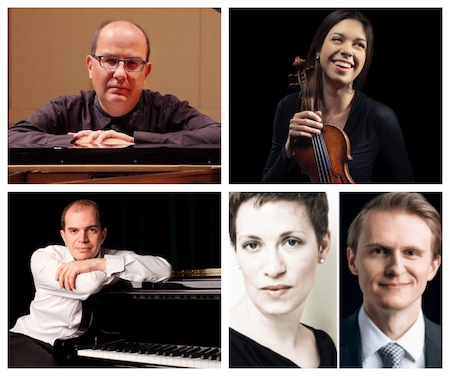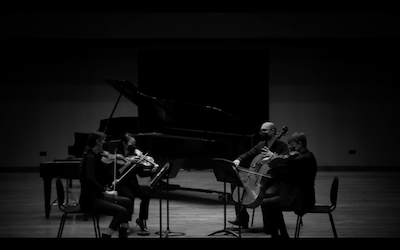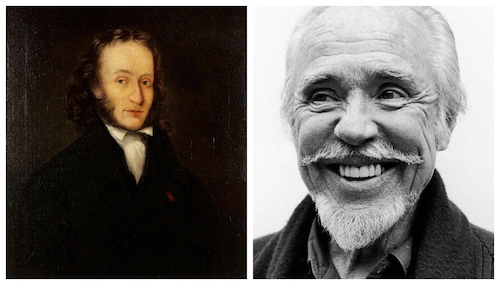by Jarrett Hoffman

•Tonight: Dossin plays Walker, Lark solos with a conductor-less CityMusic, Cleveland Orchestra welcomes Gerstein and Gardner, and LCCC hosts Les Délices
•A recent adversary for No Exit: social media
•Almanac: Paganini and Nancarrow, both pushing the limits of possibility
HAPPENING TODAY:
The time of 7:30 this evening presents you with four options.
Pianist Alexandre Dossin will take his George Walker Centenary program to CIM via a guest artist recital. His selections span six decades, from the 1940s Prelude and Caprice to the 21st-century Sonata No. 5, showcasing the composer’s long career and shifting styles. (Click here to read Jacob Strauss’s review of the program when it was presented on the Tri-C Classical Piano Series earlier this season.)
The CityMusic Orchestra will go conductor-less for the first time tonight, with violinist Tessa Lark front-and-center in a pair of romances by Dvořák and Beethoven. Also on the playlist: Beethoven’s Symphony No. 1 and Jessie Montgomery’s Starburst. The free program takes place at Temple-Tifereth Israel.
Guest artists are also on the docket for The Cleveland Orchestra tonight: conductor Edward Gardner and pianist Kirill Gerstein, who will solo in the Schumann Concerto. That work will be flanked by George Benjamin’s Ringed by a Flat Horizon and Dvořák’s Symphony No. 7. Tickets here.
And LCCC will host Les Délices in Cirigliano Studio Theatre as part of the Signature Series. Representing the ensemble will be Debra Nagy (Baroque oboe) and Mark Edwards (harpsichord), who will come together for music by J.S. Bach and François Couperin. It’s free.
NO EXIT VS. SOCIAL MEDIA:

The problem centers around two words: “Fall 2022.” You decide — when the people at No Exit included those words in the video, do you think they were referring to the current season and current year in which we find ourselves? Or were they infringing on the intellectual property rights of the 2022 movie Fall, a thriller about a pair of women stranded on top of a radio tower 2,000 feet high? We may never know.
Fortunately, you can head to the ensemble’s website to watch the concert, which includes music by Stephen Dembski, Per Nørgård, and Nasim Khorrassani.
Unfortunately, this is not the first social media-related issue that No Exit has faced this year. In the spring, after their Facebook page was the victim of hackers, the account was disabled — and it still is.
That turn of events “only serves to make engaging with the arts more difficult,” the ensemble wrote in a newsletter at the time, encouraging people to contact Facebook’s Help Center and inquire about restoring the page.
If you have a Facebook account, you can reach the Help Center on a desktop by logging in, clicking on your profile picture in the upper-right corner of the page, choosing “Help & support,” then “Report a problem,” followed by “Something went wrong.” On mobile, find “Help & support” in the menu in the lower-right corner. Until that situation gets sorted out, you can follow No Exit’s website, or get your social-media fix via their Instagram.
There’s plenty for No Exit to publicize at the moment, with three events on the calendar over the week or so: they will be presenting French new music group Court-Circuit, New York-based pianist Jenny Lin, and Buffalo-based electroacoustic ensemble The Genkin Philharmonic. You can read about those programs here.
TODAY’S ALMANAC:
Italian violinist and composer Niccolò Paganini was born on this date in 1782 in Genoa. The most famous virtuoso of his time — it was rumored that he acquired his talents through a pact with the devil — his skill as a player is plainly evident in his 24 Caprices for Solo Violin. Hilary Hahn, for one, dispels any wicked associations by playing the Caprice No. 24 in front of a large cross in this video, where you can also follow along with the score.
Where Paganini’s works push the limits of human ability, American-born Mexican composer Conlon Nancarrow went even further through the use of automation. Nancarrow, who was born on this date in 1912 in Texarkana, Arkansas, was one of the first composers to write for self-playing instruments. The results can be fascinating, as in his famous Studies for Player Piano, a set of 49 etudes. Listen to No. 37 here — as performed by a Bösendorfer-Ampico instrument restored under the composer’s supervision — and watch the piano roll go by.




